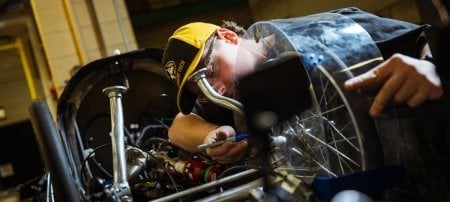“Flying is the most independent and freeing experience there is.
I learned this during my first solo flight while working toward my pilot’s certificate. I had about 10 hours of instruction in a plane when my instructor unexpectedly got out, telling me I was ready to solo. Knowing that you have the responsibility to operate an airplane safely by yourself is a unique and awesome feeling.
A second-year student majoring in physics with minors in mathematical sciences and aerospace studies, I continue to pursue my passion for aviation.
In high school, I was a part of the U.S. Air Force Junior Reserve Officer Training Corps (AFJROTC) and was awarded a flight academy scholarship. I was sent to the University of Central Missouri for an eight-week accelerated program to earn my pilot’s license. Upon accepting this scholarship, I was expected to become a member of the Civil Air Patrol (CAP), a volunteer organization under the direction of the Air Force that provides emergency services, aerospace education and youth cadet programs. Once I moved into my dorm at Michigan Tech in 2021, I searched for the closest CAP squadron near me and started attending meetings.
Joining CAP as a pilot, I just needed to attend three meetings and complete some paperwork before becoming an official senior member. Flying and continuing my training immediately became an opportunity. I took online courses and in-person training to work my way up in the squadron. I now serve as recruiting and retention officer and assistant public affairs officer, along with being a high performance G1000 VFR (visual flight rules) CAP pilot and flight officer. Through CAP, I earned my Part 107 drone license, high performance airplane endorsement, and soon, my instrument rating.
If you are interested in joining CAP and learning to fly, some instructors offer lessons free of charge, with a very reasonable rental cost on the provided CAP plane. CAP meetings take place at Houghton County Memorial Airport. There are many opportunities through CAP, even if you don’t want to be a pilot. I recommend at least attending a meeting or two to see if it interests you.
Through the Air Force ROTC program at Michigan Tech, I was sent to the U.S. Air Force Academy in July 2022 to complete the glider soaring program. ROTC cadets from around the country were invited to apply. I was one of 10 cadets chosen in the nation and one of two in the region. During our training, we were held to the same standards as academy cadets.

“Flying is one of the few fields where you will never know all there is to know about it. Every time I fly with a new instructor or just talk with another pilot, I learn something new about aviation and how to better myself as a pilot. Flying gliders was definitely a unique experience that will help me become a better powered pilot.
I expected to pick up on flying gliders quickly due to my experience in multiple other aircraft, but it is a very different flying experience. Gliders do not have engines, so they rely on a tow plane, or sometimes a winch, to pull them into the air. Their wingspan is so long that someone has to run alongside the wing and hold it level until it gains enough speed to hold off the ground. Aerotow is extremely difficult. You make little adjustments to stay behind the tow plane as you are lifted into the air. You release the cord from the tow plane at your desired altitude, usually about 2,500 feet, and are able to start soaring! The academy is in Colorado, where the elevation is extremely high — about 5,500 feet higher than Houghton — so the tow up to altitude can take a little longer than I’m used to flying. Gliders have much more durability when pulling Gs (gravitational forces, or G-forces), as well. During my first glider flight, we pulled plus 4 Gs and minus 1.5 Gs, which is the most I have ever pulled in both directions. During powered flight, you pull around plus 1.5 Gs and minus 1 G. We also got to experience aerobatic rides with certified pilots, which was amazing.
If I could fly anywhere in the world, I would first fly to North Carolina to visit my family. The distance between Tech and my home makes visiting difficult, and I would like to see them. I would also love to fly down to Lansing, Michigan, as my girlfriend and I have been long distance and we enjoy flying together when we can. I definitely want to land at the Gustaf III Airport in Saint Barthélemy one day, as only a few pilots are licensed to land at the airport due to the extremely difficult terrain and low approach necessary to stop on the short runway.
When I graduate, I want to fly fighter aircraft for the Air Force. The F-22 would be my dream fighter to fly.
If you’ve ever wanted to fly, take the step and start your flight training. There can be a lot of excuses. Some I made myself include fear of heights, no pilots in my family and little background knowledge. If you jump in with both feet and dedicate yourself to it, the difficult road will be well worth it and you will succeed.” — Jonathan Willis #mtuhumans
Michigan Technological University is a public research university founded in 1885 in Houghton, Michigan, and is home to more than 7,000 students from 55 countries around the world. Consistently ranked among the best universities in the country for return on investment, Michigan’s flagship technological university offers more than 120 undergraduate and graduate degree programs in science and technology, engineering, computing, forestry, business and economics, health professions, humanities, mathematics, social sciences, and the arts. The rural campus is situated just miles from Lake Superior in Michigan's Upper Peninsula, offering year-round opportunities for outdoor adventure.






Comments